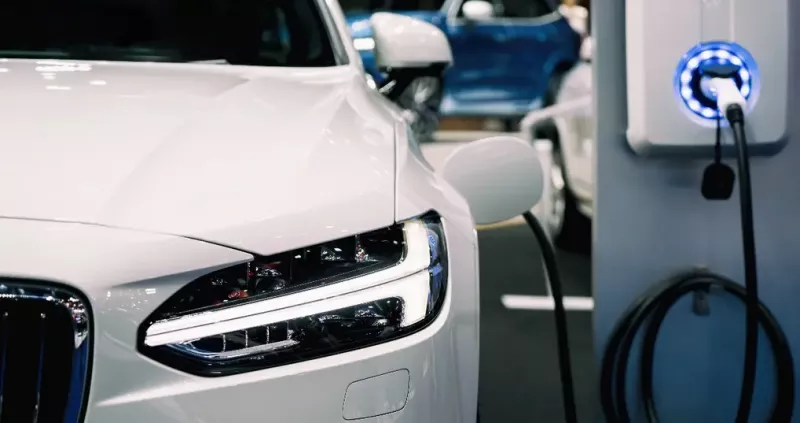Electric cars have been receiving more interest as gas prices go up, but here are a few things to consider before you buy one.
More of us are looking at the high prices at the gas pump and wondering if an electric car may be a better option. It could be very tempting to make the shift with gas prices hovering around $4 a gallon.
Hate the pain at the pump? You need this 5 step checklist ASAP.
Currently, Tesla sells the most electric cars in the American car market, representing almost 70% of electric cars sold in the United States in 2021. However, other manufacturers are cutting into Tesla’s market share as companies like Nissan, Ford, and GM start to sell their own electric vehicles (EVs).
So, is an EV right for you? Before you make the leap to electric, here are a few upfront and ongoing costs you may want to consider.
1. Higher purchase price
Before you even get the keys (or key fob) for an electric vehicle, you may notice that some EVs cost more than their internal-combustion-engine counterparts. According to Kelley Blue Book, the average price of an EV was $56,437 in November 2021. That’s about $10,000 more than the $46,329 industry average for both gas and electric vehicles. Reasons for the higher prices include increased demand and the extra technology involved in an EV.
Learn how you can potentially save up to $500 on auto insurance.
2. Higher registration fees
States sometimes add a tax gas to help pay for road repairs and other issues that need to be addressed due to the wear and tear on the nation’s roads. But since electric vehicles don’t need gas, EV owners may not be paying their fair share in infrastructure taxes.
Some states are adding an additional registration fee for electric vehicles to make up for this lost revenue. Fees vary from state to state but can range from $50 to $200 per year. Check with the state your vehicle is registered in to find out how much extra you’ll need to factor into your budget.
3. Charging on the road
You may see your electric bill go up after you get an EV and start charging it at home. But the real surprise could be when you try to charge up on the road. Prices for public charging stations vary widely by provider. Additionally, some states allow pricing based on the kWh of electricity used, while others only let providers charge on a per-minute basis.
For instance, Blink charges between four to six cents per minute or from 39 to 79 cents per kWh depending on where you charge your car. Tesla charges 28 cents per kWh where allowed and between 13 and 26 cents per minute otherwise.
4. Higher premiums
Insurance premiums for EVs may be higher than your typical gas-powered vehicles. On average, insurance premiums for EVs are about 25% higher than for a gas car. One reason is that electric vehicles can cost more to repair and replace, which bumps up insurance costs.
It’s important that you do some research on the best car insurance to find the best deal on EV insurance. Here's how you can potentially save up to $500 on auto insurance.
5. Battery replacement
Many EV drivers may experience range anxiety worrying that they may not have enough charge to get where they want to go. The good news is that battery technology is improving, allowing drivers to get farther on one charge.
However, you’ll likely need to replace your EV battery every eight years or 100,000 miles. While this seems a long way off, you could end up spending anywhere from $5,600 and $20,000 to have your battery replaced.
6. Unlocking add-ons
EV manufacturers like Tesla may brag about features like self-driving or acceleration boost, but those add-ons come at a cost. Drivers may have to pay up to several thousand dollars to unlock these electronic features and get more out of their vehicles. For example, Tesla’s full self-driving feature cost $10,000 to unlock.
Pro tip: If you’re wondering if Teslas are worth it if you have to pay to unlock additional features, check out other EV models to see if they may offer these locked Tesla features as standard on their models.
7. Higher repair costs
Repair costs could end up costing you more money since some repairs are usually more expensive on an electric car than on a gas-powered vehicle. For example, Tesla has an annual repair cost average of $832 compared to $652 for all car models. A scarcity of parts can also drive up prices when it comes to replacing parts.
There could also be an issue with who can repair your vehicle. Electric vehicle auto mechanics may not be as easy to find as combustion engine mechanics. Your car manufacturer may also have restrictions on who can repair your particular type of vehicle.
8. Home charging station
Fast chargers are a great way to get your vehicle fully charged quickly. However, getting a charger set up in your home isn’t cheap. The average cost to have an EV charger installed is about $1,500 for home use and can vary depending on labor costs, permits, and other requirements.
You may also need to buy a charger that’s specifically for your car’s make, which may leave little room to compare costs. Additional costs include finding a trained electrician who knows how to install car chargers and possibly upgrading the electrical grid in your home to handle fast charging.
9. Temperature issues
If you live in a place like California that is sunny and 75 degrees almost daily, you may not have an issue with charging.
But in other climates with more dramatic seasonal swings between cold and hot weather, the temperature could reduce your battery’s ability to get the full amount of charge in and out. This could mean more money out of your wallet to pay for charging costs that can keep up with the varied climate.
10. Charging time
Time is money, and while it may not be a tangible cost, it’s something to consider as you think about getting an EV. While a fast charger can fully charge your EV in less than 30 minutes, that’s still a lot longer than it takes to fill a traditional car at the pump. If you’re not using a fast charger, that time can increase to seven, eight, or even 12 hours.
Bottom line
If you’re thinking about an electric vehicle, it is important to consider potential hidden costs that may have an effect on your decision to get one. But there are also some advantages to picking up an EV, especially tons of savings you'd typically spend on gas. Check your budget and weigh the risks and benefits. You may be surprised to find an electric car is right for you, or you decide it’s better to stay unplugged.




